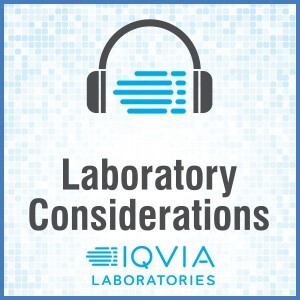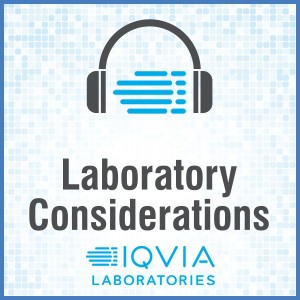Episodes

Tuesday Feb 26, 2019
Companion Diagnostic Strategies for Commercial Success
Tuesday Feb 26, 2019
Tuesday Feb 26, 2019
In this episode, he describes strategies for mitigating risk in the development of companion diagnostics (CDx) for immuno-oncology.
Depending on the bio-marker, there might be difficulties in developing an assay that correctly characterizes that bio-marker. There are also, there could be reduced ability to enter into markets due to the accessibility of that particular technology used to identify that bio-marker or test that bio-marker globally. For example, it's common throughout hospitals to have IHC or pathology review of particular of bio-markers but next-gen sequencing is a new and more expensive type of technology, so they might not be able to go after that as a particular companion diagnostic.
But, that being said, the trade-off or what they gain from getting a companion diagnostic, they have a greater chance of reaching the correct population of patients that will see the greatest benefit of their therapeutic.
The podcast conversation discusses an alternative to the traditional three-way partnership of a drug developer, an IVD manufacturer and a CRO. Single-site, pre-market approval can reduce the front-loaded investment needed for an IVD. It also can align better for the management of the project timeline.

Tuesday Feb 19, 2019
The Role of Genomics in Clinical Trials for Immuno-oncology - Dr. Patrick Hurban
Tuesday Feb 19, 2019
Tuesday Feb 19, 2019
Genomics has come a long way from the days of being primarily a discovery tool.
It used be that essentially all of the genomic data that was being produced as part of clinical trials was purely exploratory in nature. We're doing a great deal of that now, there's no doubt about that. However, now we're actually translating those into real uses. So for example, we might have specific markers that we're using for patient selection. We might have specific markers that are candidates for eventual development companion diagnostic and so we are taking them into clinical trials, characterizing them further.
Dr. Hurban discusses the use of broad genomic features such as microsatellite instability and tumor mutational burden as biomarkers in addition to specific point mutations that have been in use for some time.
He envisions a future where a multidisciplinary approach leads to a companion therapeutic strategy as opposed to a companion diagnostic strategy. In this approach, a single test could direct a patient into any of a number of therapies rather than testing the possibility of one therapy at a time.

Tuesday Feb 12, 2019
Bioanalysis for Immuno-oncology - Dr. Mike Brown
Tuesday Feb 12, 2019
Tuesday Feb 12, 2019
Mike Brown is the Senior Director of Immuno-analytical and the Bioanalytical Site Lead at Q2 Solutions. In this episode, he describes the considerations for pharmacokinetic and immunogenicity assays in the development of biologics.
He lays out the types of analysis that are needed along with the associated challenges, such as detecting the concentration of a specific antibody therapeutic present at 100 picograms/ml in an antibody background of up to 20 billion picograms/ml. He suggests that sponsors think about the reagents that will be essential for the assays that need to be performed. An analyst will ask:
"Are you going to help put some tools in our toolbox to be able to see that needle in a haystack?" And what the sponsors need to be able to do is to really have good lines of communication within their company, to make sure during the drug development program, that they actually are beginning to invest in those specific materials.
And having disease state matrix during method development, also, in my opinion, it's critical to ensuring that once we get into that patient population, we reduce the risk those are going to be big surprises for working in that biological matrix that's going to interfere with that assay selectivity. The lead times can be significant as can the price, but it really does mitigate risk.
Dr Brown also recommends engaging the FDA early to reduce any risk to your timelines. No one wants to get to the point of submission to find out that the approach was unacceptable and lose precious time.

Tuesday Feb 05, 2019
Anatomic Pathology
Tuesday Feb 05, 2019
Tuesday Feb 05, 2019
In this episode, Dr. Radha Krishnan describes three key challenges in immuno-oncology development related to anatomic pathology. Some of the key challenges organizations that support clinical trials I-O drug development see, particularly with the context of companion diagnostics, involves ensuring the sample availability is adequate and appropriate for the different clinical trials, that the assay outcome is useful and the results are relevant for the clinical trials.
It is discussed how having adequacy of tissue samples is one of the most critical components. It's also important that the sites that are sending samples have the ability to process samples in a timely manner, establishing that the fixation and other pre-analytical conditions that influence the outcome of the results are well evaluated. Dr. Krishnan provides a vision that will make the whole process easier for patients and doctors alike.

Tuesday Feb 05, 2019
Selection of Biomarkers for Immuno-Oncology - Patrice Hugo
Tuesday Feb 05, 2019
Tuesday Feb 05, 2019
Dr. Patrice Hugo, Chief Scientific Advisor at Q2 Solutions discusses the selection and use of biomarkers in Immuno-oncology trials and the importance of early engagement between sponsors and clinical trial partners.
We are seeing that too often, in early phase clinical trials, drug developers for immuno-oncology investigation of products are considering bio-markers as true CDx or companion diagnostics; when in fact, they aim at producing information at a later stage, evaluating the potential of these bio-markers to be of CDx. At times the confusion here is adding a lot of pressure to the clinical labs to validate the assays to a level of stringency that is not necessarily required at that early stage. It also adds to the cost and complexity of the study. For bio-markers that are not considered as companion diagnostics, one of the main problems is how the data is generated, and how it's going to be used by the sponsor to support their drug development.
Dr. Hugo explains the importance of the results generated from candidate companion diagnostic markers, the relationship with IVD manufacturers that are developing CDx and the global regulatory environment.

